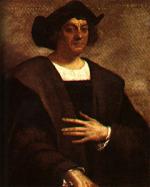|
This section contains 384 words (approx. 2 pages at 300 words per page) |
Columbus: Progress Creates Genocide
Christopher Columbus sailed the sea blue in 1492, and he made it to what he thought was Asia in hope to find gold and spices. These hopes led Columbus to a ferocious life of greed, cruelty, and savageness. When he landed off the coast of today's Bahamas, he met the Arawaks. This Indian tribe helped him in every way they could, never raising a sword to the Europeans. However, when these Indians feel short of Columbus's demands, they were slaughtered, imprisoned, or brutally severed for life. No matter how bad the situation the natives could not hide for the Spaniards. "Among the Arawaks, mass suicides began, with cassava poison. Infants were killed to save them from the Spaniards. In two years, through murder, mutilation, or suicide, half of the 250,000 Indians on Haiti were dead. (A People's History of United States, 5)" This quote goes to show that because of Columbus's regards to creating "human progress", by mining gold and forceful labor, he created a destruction of a complex cultural history where relations worked on equal levels of manner.
Many historians disregard the fact about the natives receiving the underlying work from these external forces. They look at these external forces as heroes for such great establishments. This gives people looking to historians for fact some sense of falsehood that though these external forces may have came up with some type of idea for these establishments but they never did the arduous work behind it all. These establishments truly may have brought seconds of wonder but it took years of pain, whipping, and suffering by innocent humans.
|
This section contains 384 words (approx. 2 pages at 300 words per page) |


